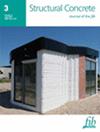Optimization of steam curing process for Chinese Western and Northeast regions' high‐speed railway concrete prefabricated components
IF 3.3
3区 工程技术
Q2 CONSTRUCTION & BUILDING TECHNOLOGY
引用次数: 0
Abstract
This article aims to address the issues of high curing temperatures and thermal damage in the production of prefabricated concrete components for high‐speed railways in high‐altitude and high‐latitude cold regions of China. Various steam‐curing processes for concrete are designed to optimize the high‐quality preparation process of steam‐cured concrete prefabricated components in cold environments. With the goal of controlling the residual expansion deformation and considering the overall impact of curing process on the mechanics, durability, and interface transition zone of steam‐cured concrete, the main conclusions obtained in this study are as follows. Within a pre‐curing time of 3–6 h, when the curing temperature is maintained at 45–60°C, the final residual expansion deformation can be controlled below 300 με. The compressive strength, dynamic elastic modulus, peak stress, water absorption and Chloride ion resistance of steam‐cured concrete show the great improvement under above curing processes. Curing at 80°C should be actively avoided, and it is recommended to adopt a 6 h pre‐curing time with a maximum curing temperature of 45°C, especially for cold regions in China. This study can serve as a valuable reference and provide support for the preparation of prefabricated concrete components in Chinese high‐altitude and high‐latitude areas.优化中国西部和东北地区高速铁路混凝土预制构件的蒸汽养护工艺
本文旨在解决中国高海拔和高纬度寒冷地区高速铁路混凝土预制构件生产过程中的高养护温度和热损伤问题。为优化寒冷环境下蒸汽养护混凝土预制构件的高质量制备工艺,设计了多种混凝土蒸汽养护工艺。以控制残余膨胀变形为目标,综合考虑养护工艺对蒸养混凝土力学、耐久性和界面过渡区的影响,本研究得出以下主要结论。在预养护时间为 3-6 小时内,当养护温度保持在 45-60°C 时,最终残余膨胀变形可控制在 300 με 以下。在上述养护过程中,蒸养混凝土的抗压强度、动弹性模量、峰值应力、吸水率和抗氯离子能力都有很大提高。应积极避免 80°C 的养护温度,建议采用 6 h 的预养护时间和 45°C 的最高养护温度,尤其适用于中国寒冷地区。本研究可为中国高海拔和高纬度地区预制混凝土构件的制备提供有价值的参考和支持。
本文章由计算机程序翻译,如有差异,请以英文原文为准。
求助全文
约1分钟内获得全文
求助全文
来源期刊

Structural Concrete
CONSTRUCTION & BUILDING TECHNOLOGY-ENGINEERING, CIVIL
CiteScore
5.60
自引率
15.60%
发文量
284
审稿时长
3 months
期刊介绍:
Structural Concrete, the official journal of the fib, provides conceptual and procedural guidance in the field of concrete construction, and features peer-reviewed papers, keynote research and industry news covering all aspects of the design, construction, performance in service and demolition of concrete structures.
Main topics:
design, construction, performance in service, conservation (assessment, maintenance, strengthening) and demolition of concrete structures
research about the behaviour of concrete structures
development of design methods
fib Model Code
sustainability of concrete structures.
 求助内容:
求助内容: 应助结果提醒方式:
应助结果提醒方式:


